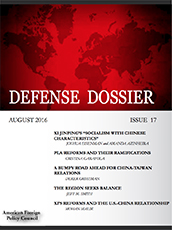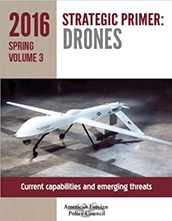China Reform Monitor: No. 1234
Thousands of African migrants flee Guangzhou;
Chinese outbound investment soars in 2016
Thousands of African migrants flee Guangzhou;
Chinese outbound investment soars in 2016
Chinese fishermen raise hackles off West Africa;
Xi stresses Party’
s Marxist roots
A worsening AIDS epidemic;
Russia's Olympic doping scandal deepens
Russia's new extremism list puts journalists on notice;
Sending the S-400 to Crimea
Jihadists push for Palestinian recruits...;
...as Hamas prepares political power play;
China's Jihadists;
Uzbekistan's resilient radicalism;
France rethinks its relationship with Islam;
New insights into ISIS tactics
Russian mob makes inroads into Germany;
All eyes on the Arctic
Russian soft power comes to Germany;
Dim hopes for the Duma

Xi Jinping's "socialism With Chinese Characteristics"
Pla Reforms And Their Ramifications
A Bumpy Road Ahead For China-Taiwan Relations
The Region Seeks Balance
Xi's Reforms And The U.S.-China Relationship
Iran still seeks nukes...quietly;
A second act for Ahmadinejad;
Iran shakes up its military;
Some economic breathing room from the FATF;
Iran trains its Afghan legion
Sisi's appeal;
Terrorism and the internet of things;
The Islamic State's shifting strategy;
Jittery in Seoul;
Al-Qaeda reemerges in South Asia;
ISIS targets African youth
American diplomats targeted for harassment... or worse;
Russia's problematic "
Wahhabi count"
Russia's secret space base;
Tightening the counterterrorism noose
Cyber command to enhance training Ops;
How to cripple the U.S. electrical grid;
Israel develops land battle drone;
NATO and the importance of cyber;
Is A.I. the future of aerial combat?
Israel's growing diplomatic, military, and economic ties across the Middle East Africa, and Asia should shatter an enduring myth: that the Israel-Palestinian conflict will make Israel an international pariah.
These ties reflect not only the foresight of Israel's leaders, the doggedness of its diplomacy and the strength of its economy, but also the rise of Iran in the region and the spread of terrorism beyond it.
China witnesses major capital outflows;
Head of Cyberspace Administration unexpectedly replaced
China to build 2 new nuclear reactors for Argentina;
Beijing eyes major expansion of wind power
Russia's growing soft power clout;
Putin's political bank, on the skids
Back in 2008, at the height of the global economic meltdown, Rahm Emanuel, President-elect Obama's designee for chief of staff, summed up his guiding political philosophy. "You never want a serious crisis to go to waste," he told the Wall Street Journal. "Things that we had postponed for too long, that were long-term, are now immediate and must be dealt with."
Machiavelli counseled, "never do an enemy a small injury." Ralph Waldo Emerson rendered the same thought as, "never strike a king unless you are sure you shall kill him." The coup plotters in Turkey can ponder these aphorisms from their cells while they await their potentially grisly fates.
The human cost of the Crimean takeover;
An exodus of intellectual capital
Russia's bridge to nowhere;
Playing fast and loose with New START
Before the nuclear deal between Iran and the countries of the P5+1 (the United States, United Kingdom, Russia, China, France and Germany) was concluded a year ago today, the true extent of the compromise struck over Iran's nuclear ambitions wasn't yet publicly known.
CCP threatens tighter regulations on media;
China’
s first high-orbit imaging satellite operational
Indonesia confronts Chinese fishing near Natunas;
Deal to bring Chinese high-speed rail to California nixed
As the global nuclear deal with Iran marks its one-year anniversary this week, Tehran is maintaining its fierce anti-Americanism, receiving $100 billion-plus in sanctions relief with which it can better confront the United States in its region and beyond, and apparently trying to cheat its way to nuclear weaponry.
Iran stumbles in SCO bid;
Turkmenistan takes sides;
Pushing back against Kyrgyzstan's new media law;
Georgia in the balance
China-DPRK trade gets boost after THAAD announcement;
Indonesia hardens line on South China Sea territories
Russia's secret nuclear city;
New bases... and military mobilization
China's answer to U.S. lasers;
European missile defense moves ahead;
Space assets and the fight against ISIS;
Another step forward for Iron Dome;
Railguns becoming a reality;
China takes aim with new missile
You could say that Serhiy Kvit is a man on a mission. The soft-spoken 50-year-old former journalist may no longer be Ukraine's minister of education and science, having stepped down from that post back in April as part of a governmental reshuffle that accompanied the resignation of controversial Prime Minister Arsenii Yatsenyuk. But he nonetheless remains at the forefront of the fight for the intellectual future of his country.
South Korean and Chinese fishermen clash;
Russia: no S-400s to China before 2018
How Russians see the world;
An escalation in Syria?
Late last year, Captain Khatoon Ali Krdr, 36, the commander of an all-female Kurdish peshmerga unit, visited a family in the village of Kocho in northern Iraqi Kurdistan to see a woman who'd had nearly everything taken away by the Islamic State (ISIS). Like Khatoon, the woman and her surviving family members are Yezidis, an ethno-religious Kurdish minority group. ISIS has long enslaved, tortured, and killed, Yezidi women. Khatoon tried to speak to the woman, but she could not answer. These days, she is mute and can only stare ahead.
Taiwan leaders urge China to embrace democracy;
Xi meets senior DPRK leader, no progress on nukes
Slowly but surely, a strategic reorientation is underway in Israel. Earlier this month, Prime Minister Benjamin Netanyahu made a high-profile state visit to Russia. The trip, Netanyahu's fourth in the past year, was a public sign of the rapidly expanding ties between Jerusalem and Moscow.
Last week's vote by England to formally leave the European Union has touched off nothing short of a political earthquake, both in Europe and in the United States. In the aftermath of Thursday's referendum, which saw a slim majority (52 percent) of Britons vote in favor of "Brexit," there has been no shortage of recriminations from the chattering classes on both sides of the Atlantic, which have been quick to label Britons as both xenophobic and foolish for their choice.
Europe goes wobbly on sanctions against Russia;
Moscow eyes the Baltics

Remotely Piloted Aircrafts (RPAs, or drones) are playing an increasingly important role in modern warfare, and performing a growing nunmber of surveillance and reconnaissance missions at home and abroad.
Freedom for Savchenko;
The Kremlin's plan to control the Russian internet
Rise of the bio bot drones;
The Pentagon's micro UAVs A new kind of submarine hunter;
Missile defense looks left of launch;
Blimp funding deflated
Jihadists are hailing the mass shooting at the Orlando gay nightclub Pulse as an Islamist victory. The Islamic State terror group has claimed credit for the atrocity, saying "a soldier of the Islamic State has carried out the attack." President Barack Obama said that the shooter, Omar Mateen, was "filled with hatred" and that the investigation "will go wherever the facts lead us." They will lead directly to radical Islamism.
Islamist synergy in the Sinai;
France's African outpost;
Islamism's rising tide in the Americas;
A Jihadist sanctuary in Pakistan
Moscow seeks a stake in internet governance;
New penalties for insulting the national anthem
Israel responded to a Palestinian terror attack in Tel Aviv which claimed four lives by revoking 83,000 travel permits for Palestinians to enter the country during Ramadan. The United Nations High Commissioner for Human Rights suggests that response amounts to "collective punishment" and is, thus, illegal under international law.
What Russia learned in Syria;
Russia's schools get militarized
Russia's response to missile defense: missile trains;
Moscow stonewalls on Yanukovych accountability
Pakistan returned to the headlines last month, after a U.S. air strike eliminated Afghan Taliban commander Mullah Mansour inside Pakistani territory. It marked the first ever U.S. strike on an Afghan Taliban leader inside the group's Pakistani sanctuary of Baluchistan, which had been off-limits to U.S. drones as part of an informal arrangement with Islamabad. Washington has touted the drone strike as an important victory for the U.S. war effort in Afghanistan. However, it will prove symbolic and short-lived unless it prompts more fundamental reform of America's Pakistan policy. To effect real change, Washington must increase pressure not just on the Taliban residing in Pakistan, but on Pakistan itself.
Spotlight on "
left-behind children”
Beijing tries to lower expectations of economic rebound
Spotlight on China's Underwater Great Wall Project;
China-Venezuela relations take turn for the worse
Nearly a year after its passage, the nuclear deal with Iran - formally known as the Joint Comprehensive Plan of Action - remains a political football in Washington. In response to pressure from Tehran, the Obama administration continues to seek ever-greater sanctions relief for the Iranian regime. The justification propounded by administration officials, from Secretary of State John Kerry on down, is that Iran has yet to reap real benefits from the deal and, therefore, a further sweetening of the pot is necessary to ensure its continued compliance with the terms of the deal.